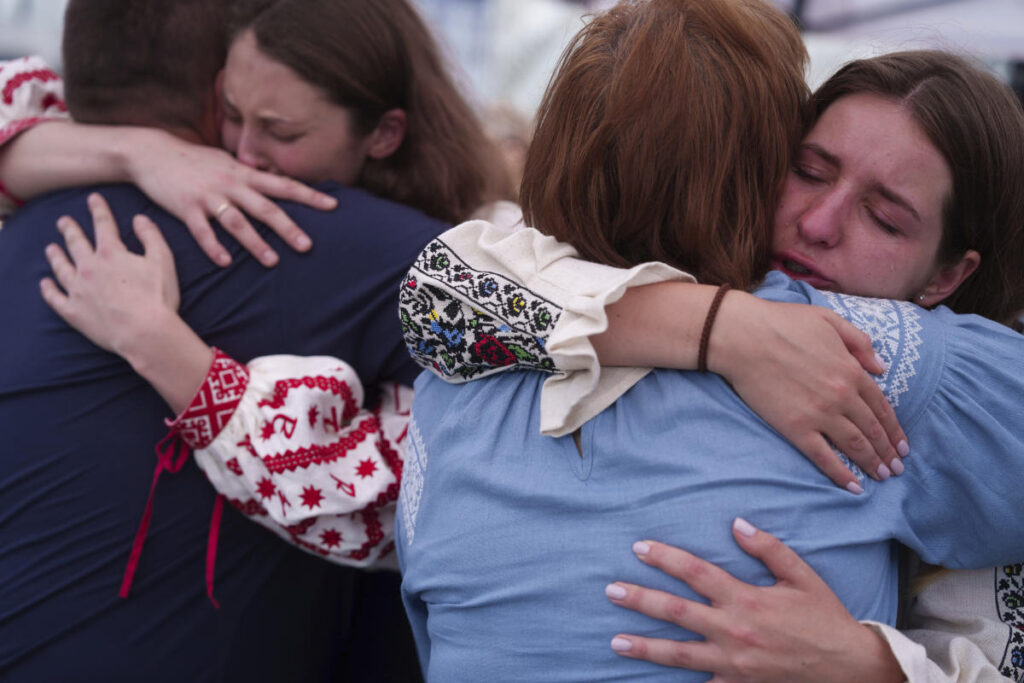KYIV, Ukraine (AP) — Nearly 1,000 people attended a ceremony Sunday honoring the memory of Ukrainian journalist Iryna Tsybukh, who was killed while serving as a volunteer combat medic a few days before her 26th birthday.
Tsybukh was killed during a rotation in the Kharkov area, where Russia began its mission offensive almost a month ago.
She left a note describing how she wanted the ceremony to take place, asking people to sing Ukrainian songs and attend the ceremony wearing vyshyvankas – traditional embroidered shirts – instead of black clothing.
“I want everyone to sing at the farewell, learn at least ten meaningful songs and sing them in choir, to quench sadness with native songs,” she wrote. And in lieu of flowers, she said, she asked people to donate to the Hospitallers Volunteer Medical Batallion, where she served.
A large crowd gathered in the courtyard of St. Michael’s Monastery in Kiev, where the memorial service was held. People later joined a column that marched to the central Independence Square, a ritual that has become common at funerals of fallen soldiers.
As the wide motorcade moved down central Mykhailivska Street, passing shops and restaurants, people turned onto the streets and those walking stopped to pay tribute to Tsybukh. Some knelt, including children, and men took off their caps and held them to their hearts. The crowd sang, “Heroes Don’t Die,” as they wiped away tears.
Tsybukh’s death sparked widespread reactions on social media, where her letter went viral several days after her death.
“Today everything is behind me, my life has ended, and it was important for me to live it with dignity: to be an honest, kind and loving person,” she said in the letter she wrote a year ago when she was in served in prison. the disputed Donetsk region. Her brother shared it, as she wanted, on Instagram.
“To have the power to be a free person, you must be brave,” she wrote.
When the motorcade arrived at Independence Square, hundreds of people knelt as the closed coffin, covered with the blue-yellow national flag, was placed at the front. Thousands of people wore vyshyvankas, which are usually worn at celebrations, and took turns walking to the coffin.
Tsybukh’s close friends distributed printed lyrics of the songs she wanted sung at her funeral, including songs that have become symbolic of Ukraine’s resistance to Russia’s armed aggression.
“We will sing every minute, in honor of how she saved the army with every minute,” one of Tsybukh’s friends said over the loudspeaker.
For two hours, people continued to approach the coffin to say goodbye.
A funeral will take place in Tsybukh’s hometown of Lviv on Monday.
Those attending the memorial service included many soldiers, activists, journalists and people who followed Tsybukh on social media.
“I am very grateful to everyone who is here today because it means that we are united, that we are strong and that we will persevere,” said Tsybukh’s friend Kateryna Serdiuk. “Her cause will live on because we live and we will continue”
The past two years have funerals have in Ukraine become daily events.
“The realization that our best are dying shatters the heart into pieces that can never be put back together,” Serdiuk said.
Before the Russian invasion, Tsybukh was part of the management team that implemented reforms at the Ukrainian public broadcaster Suspilne. She also oversaw educational projects in remote villages in the Donetsk and Luhansk regions.
Shortly after the outbreak of war, she joined the Knights Hospitaller, a volunteer unit. She had previously completed several rotations since 2014, when Russia first began armed aggression in eastern Ukraine. Tsybukh facilitated the evacuation of wounded soldiers from the battlefield and provided first aid to many. In November, she received the Order of Merit, 3rd Class, from President Volodymyr Zelenskyy.
“I am a young girl, just like any other girl in France or Spain. The only difference is that we have a totalitarian regime on our border that has attacked the country that I love dearly,” she said in a 2022 interview with Elle. “That is why I defend my country, and I am willing to die to have freedom in my country.”
At least 91 media workers have been killed since the war broke out, according to the National Union of Journalists of Ukraine.







